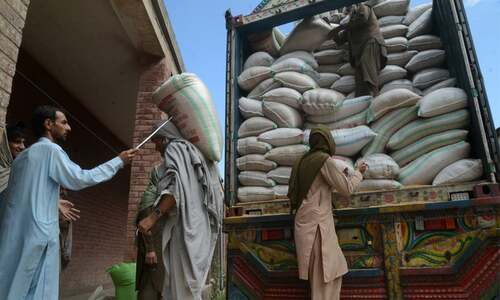IT’S a saga that refuses to go away. The Supreme Court and the PPP-led government in Islamabad are at it again, one side apparently trying to vigorously pursue cases of corruption which reach into the inner sanctums of the PPP hierarchy, the other seemingly steadfast in its defiance of sundry court orders. Caught in the middle is the bureaucracy, unsure whether to obey the dictates of the court or to invite the displeasure of the bureaucracy’s political bosses. PPP circles argue their government is being harassed by an unfriendly court and see conspiracies to topple their government everywhere. They cite as ‘proof’ the fact that the judiciary-executive tussle seems to have an endless life, with a new crisis erupting soon after the last one is ‘resolved’. But there is some reason for scepticism.
For one, why has it become impossible for even the most routine of investigations into allegations of corruption to proceed? If the government’s claim is that the appointment of civil servants beyond a certain grade is the prerogative of the prime minister, then so be it: let the government appoint another investigator who will pursue the cases. If Hussain Asghar or Zafar Qureshi are somehow ineligible or undesirable to investigate the Haj or NICL scam, why is it that the replacements the government seeks to appoint are invariably seen as weak and pliant? It’s a rhetorical question, really. The present government appears to have made a fetish out of unaccountability and opaqueness. What began as a constitutional argument in favour of President Zardari’s immunity and as a plea for political stability at a time the democratic project was tenuous has now transmogrified into a ridiculous catch-all excuse. Any case, any investigation, any semblance of possible accountability of officials and political partners, and the government is seen creating all sorts of procedural and other hurdles.
And yet this wouldn’t be Pakistan without all sides having some blame to shoulder. Free and independent investigations are necessary to ensure, but at times it appears the majority of the superior judiciary’s time and effort is dedicated to the pursuit of a handful of cases. From allegations against the judiciary to the armed forces and against parties across the political spectrum to the bureaucracy itself, the stench of corruption is deep and pervasive. But there is little judicial movement on any of those other fronts. Moreover, where is the all-consuming desire to improve the delivery of justice to the average Pakistani? Or even concern for the collateral damage caused to the bureaucracy, further eroding the already poor state of governance as bureaucrats are tugged and pulled in opposing directions?











































Dear visitor, the comments section is undergoing an overhaul and will return soon.